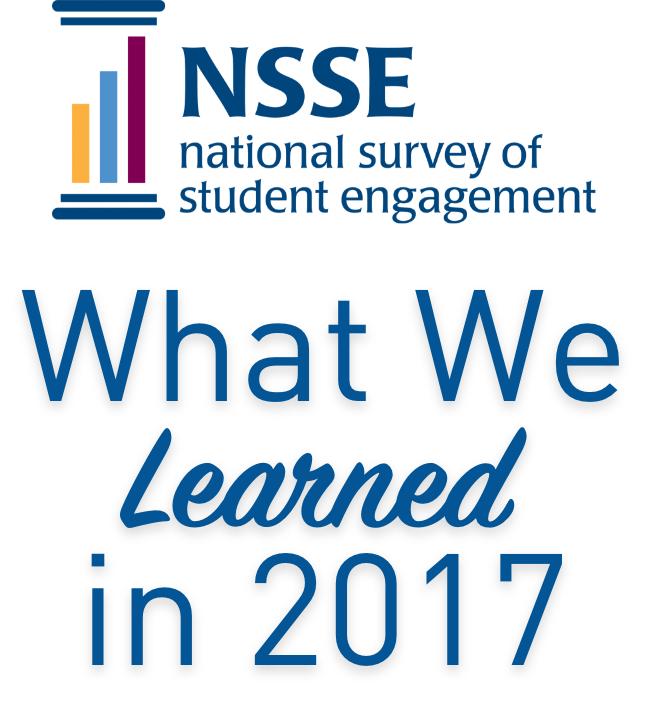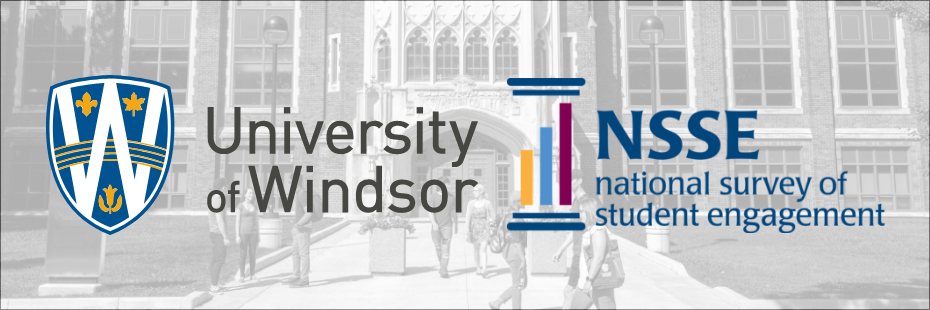
Every three years, the University invites students in their first and final years to take part in the National Survey of Student Engagement (NSSE), where students share their perceptions of what’s happening in and out of class, what engages them, what works – and what needs work. In Spring 2020, students will get the chance again to share their experiences and perceptions.
“There is much to do to understand what students are telling us and to respond to their feedback effectively,” says Provost Douglas Kneale. “NSSE is a truly rich source of information about what students are doing and experiencing, and we are looking forward to digging into this information and working to make improvements based on what students have told us.”
Students in their first and final years will be contacted via email with invitations to take part. A link will appear on Blackboard in early February 2020. Students who complete the survey by April 15, 2020 will receive $5 deposited to their UWinCARD.
It only takes 15 minutes to complete the survey.
Make UWindsor’s stories matter in 2020!
What is NSSE?
The NSSE survey gathers information about factors and practices which have been positively associated with student learning and persistence. These include:
Four engagement indicators
- Academic challenge
- Learning with peers
- Experiences with faculty, and
- The campus environment.
It also looks at six “high-impact practices”
- Being part of a learning community or some other formal program where groups of students take two or more classes together
- Taking courses that include a community-based project (service-learning)
- Working with a faculty member on a research project
- Internships, co-ops, field experiences, student teaching, or clinical placements
- Studying abroad
- Undertaking a culminating senior experience (like capstone courses, senior project or thesis, comprehensive exam, portfolio, etc.).
The survey enables us to get a snapshot of what students are experiencing and perceiving at the University of Windsor, and also to compare those experiences to those of others in similar faculties or disciplines at other institutions. It's one way to get a sense of what's working (what we want more of) and what needs some work.
Why Should I Take the Survey?
- Your chance to tell senior leaders at UWindsor about your experiences on and off campus directly – what engages you deeply (and what doesn’t), what works well, and what needs improving.
- Your opportunity to make sure your experiences here are accurately represented beyond our institution -- NSSE is used by magazines like Maclean's to make comparisons among institutions.
- You'll receive $5 on your UWinCARD for completing the survey by April 15, 2020.
- Easy. It only takes 15 minutes, and it can make a big difference on how people perceive your university.
- Confidential -- people reading the reporting will never know your identity, which is always reported at the "group" level.
Please note only eligible first- and fourth-year students will receive the survey invite email and link on their Blackboard site.
NSSE: Make your stories matter in 2020.
What is NSSE?
The NSSE survey gathers information about factors and practices which have been positively associated with student learning and persistence. These include:
Four engagement indicators
- Academic challenge
- Learning with peers
- Experiences with faculty, and
- The campus environment.
It also looks at six “high-impact practices”
- Being part of a learning community or some other formal program where groups of students take two or more classes together
- Taking courses that include a community-based project (service-learning)
- Working with a faculty member on a research project
- Internships, co-ops, field experiences, student teaching, or clinical placements
- Studying abroad
- Undertaking a culminating senior experience (like capstone courses, senior project or thesis, comprehensive exam, portfolio, etc.).
Why Should I Promote NSSE to My Students?
- High response rates on NSSE improve the accuracy of the information gathered, making it more likely that your department will be able to get data from just your students, rather than just institutional-level data.
- In terms of your ongoing efforts on behalf of students, this means better opportunities to:
- Document the great work that instructors, staff, departments and students put into the student experiences here.
- Pinpoint specific areas, often even at the department level, where students would like to see change, and provide information departments and faculties can use to plan future projects.
- Identify the unique strengths, experiences, and opportunities that characterize your department or faculty so that we can share that evidence with the world.
- NSSE data also matters to all of us because of the ways it is used by external bodies for comparisons among universities (as in Maclean's) and because, going forward, it is likely to play a role in provincial funding determinations. Potentially our results can impact our funding over the next funding cycle.
How Can I Promote NSSE to Students?
- Take a few minutes in class to explain NSSE and its value to students in your first- and final-year courses -- or contact Bev Hamilton in the Office of the Provost at beverley@uwindsor.ca or at 519-235-3000 ext. 4835 to find out about getting a student to come and promote it.
- Dr. Dora Cavallo-Medved (Biomedical Sciences) has generously developed a simple PowerPoint presentation that introduces NSSE to students.
Some Things You Can't Do
- The participation incentive being used in this round of NSSE has already received Research Ethics Clearance. This means that it's not allowable to provide other direct incentives (like extra marks or a prize) to students for their participation. Also, students need to be free to make this decision for themselves -- so anything that makes them feel pressured to participate should be avoided (for example, making it mandatory, or having someone who is giving them grades see if they are doing it or not).
- Please contact Robyn Nease in Institutional Analysis at robyn@uwindsor.ca or at 519-235-3000 ext. 2156 if you have any questions about NSSE survey procedures.


